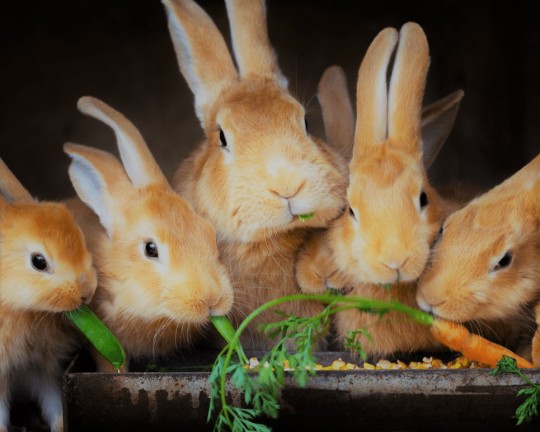Don't wanna be here? Send us removal request.
Text
A Balanced Diet for Happy Bunnies: Essential Nutrients for Rabbits
Rabbits are adorable and popular pets known for their playful nature and gentle demeanor. To ensure their well-being and longevity, it is vital to provide them with a balanced and nutritious diet. A proper rabbit diet is essential for maintaining their overall health, supporting their growth, and preventing common health issues. This article serves as a comprehensive guide on the essential nutrients that rabbits require and how to craft a well-balanced diet for these furry companions.

Understanding the Nutritional Needs of Rabbits:
Rabbits are herbivores, and their digestive systems are designed to process a diet rich in fiber. A proper rabbit diet should primarily consist of high-quality hay, fresh vegetables, and a limited amount of pellets or commercial rabbit food. Understanding the key nutrients required by rabbits is crucial for their optimal health and well-being.
a. Fiber: Fiber is the most critical component of a rabbit's diet. It aids in proper digestion, prevents obesity, and keeps their teeth healthy.
b. Protein: While rabbits require protein for muscle maintenance and growth, excessive protein intake can lead to health problems. The ideal protein content in their diet should be around 12-14%.
c. Vitamins and Minerals: Rabbits need essential vitamins and minerals such as vitamin A, vitamin D, calcium, and phosphorus to maintain healthy bones, teeth, and overall immunity.
d. Water: Access to fresh, clean water is essential for rabbits to stay hydrated and support proper digestion.
The Foundation of a Rabbit's Diet: High-Quality Hay Hay is the cornerstone of a rabbit's diet and should constitute the majority of their daily food intake. There are different types of hay available, but the most commonly recommended ones are timothy hay, meadow hay, and orchard grass hay. Hay provides the necessary fiber for healthy digestion, helps grind down their continuously growing teeth, and keeps them mentally stimulated.
Fresh Vegetables: Adding Variety and Nutrients In addition to hay, fresh vegetables should be an integral part of a rabbit's diet. Vegetables offer a variety of nutrients and flavors, making meals more enjoyable for your furry companion. Some safe and nutritious vegetables for rabbits include:
Leafy greens: Romaine lettuce, kale, parsley, cilantro, and dandelion greens. Non-leafy vegetables: Carrots, bell peppers, zucchini, and broccoli (in moderation). Note: Introduce new vegetables gradually to avoid upsetting their sensitive digestive system.
Commercial Pellets: A Supplementary Food Commercial rabbit pellets can be offered as a supplement to hay and vegetables. However, it is essential to choose high-quality pellets that are specifically formulated for rabbits. Look for pellets with lower protein content and high fiber to support their digestive health. Pellets should make up only a small portion of their daily diet, as an excess of pellets may lead to obesity and other health issues.

Treats and Fruits: Occasional Indulgences Treats and fruits should be given sparingly and in small quantities, as they are high in sugar and can disrupt the delicate balance of a rabbit's digestive system. Suitable treats include small pieces of apple, pear, or banana. Avoid giving them sugary or starchy treats, such as cookies or crackers, as they can be harmful to rabbits.
FAQs:
Can rabbits eat grass, and is it necessary for their diet?
Yes, rabbits can eat fresh grass, which is an excellent source of fiber and nutrients. Supervised outdoor grazing can be beneficial for their well-being, but ensure that the grass is free from pesticides and chemicals.
How much hay should I feed my rabbit each day?
Rabbits should have unlimited access to fresh hay at all times. Provide enough hay to fill their hay rack or feeding area, and replenish it regularly.
What should I do if my rabbit refuses to eat hay?
Hay is essential for a rabbit's health, and if they refuse to eat it, consult a veterinarian to rule out any underlying health issues. You can try offering different types of hay or mixing hay with some of their favorite vegetables.
Is it safe to give my rabbit treats from the pet store?
Not all pet store treats are safe for rabbits. Read the ingredient list and avoid treats with added sugars, artificial colors, or unhealthy additives.
Can I feed my rabbit human food scraps?
It is generally not recommended to feed rabbits human food scraps, as they may contain ingredients that are harmful to them. Stick to rabbit-safe fruits and vegetables.
Is it necessary to provide a salt lick for my rabbit?
Rabbits do not require a salt lick if they are consuming a well-balanced diet. Fresh water should provide all the hydration and necessary minerals they need.
Conclusion:
Crafting a balanced and nutritious diet is crucial for the overall health and well-being of rabbits. A diet based on high-quality hay, supplemented with fresh vegetables and limited pellets, provides the necessary nutrients to support their growth and maintain their digestive health. While occasional treats and fruits can be offered as indulgences, it is essential to avoid excessive sugar intake. Providing a well-rounded diet, along with plenty of fresh water and occasional outdoor grazing, will ensure that your beloved bunny enjoys a happy and healthy life by your side.
1 note
·
View note